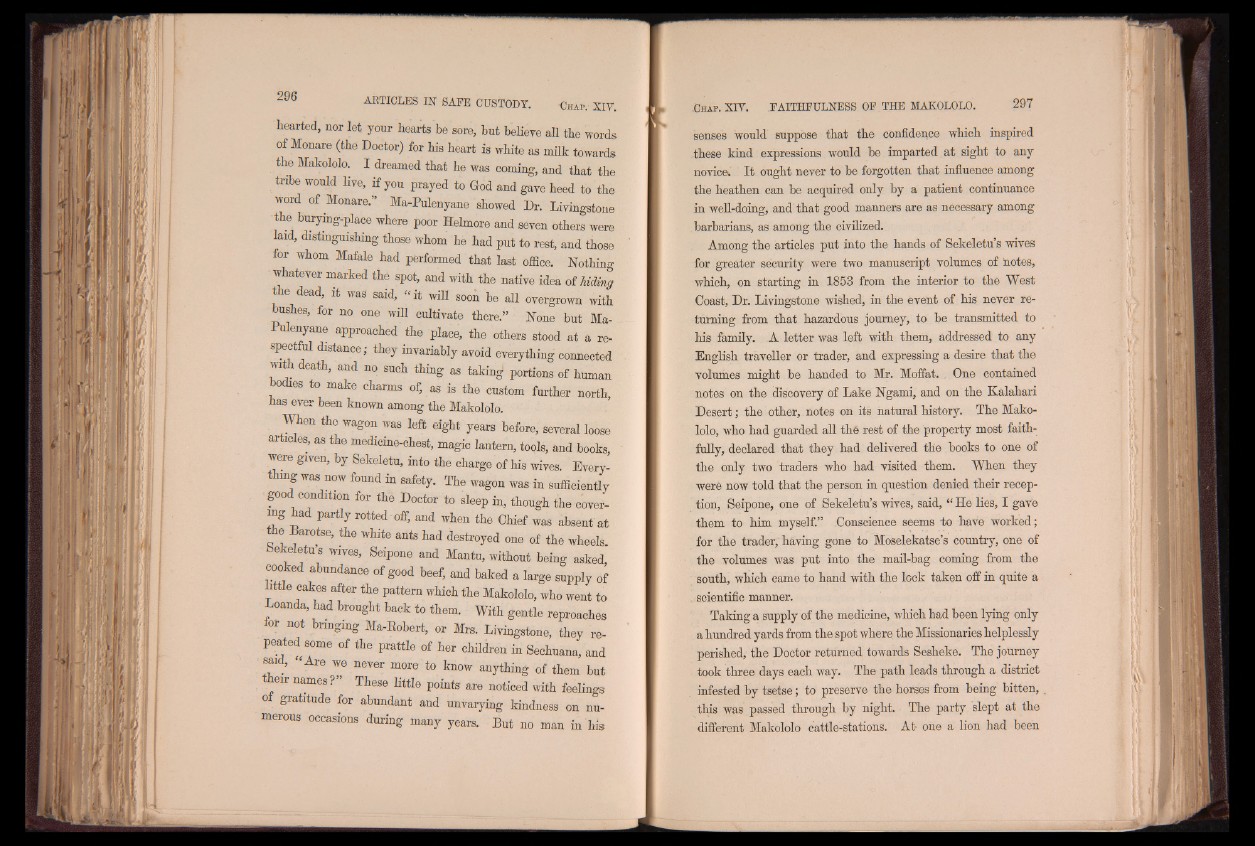
hearted, nor let your hearts be sore, but believe all the words
of Monare (the Doctor) for his heart is white as milk towards
the Makololo. I dreamed that he was coming, and that the
tribe would live, if you prayed to God and gave heed to the
word of Monare.” Ma-Pulenyane showed Dr. Livingstone
the burying-place where poor Helmore and seven others were
laid, distinguishing those whom he had put to rest, and those
for whom Mafale had performed that last office. Nothing
whatever marked the spot, and with the native idea of hiding
the dead, it was said, “ it will seek be all overgrown with
toshes, for no one will cultivate there.” None but Ma-
Pulenyane approached the place, the others stood at a respectful
distance; they invariably avoid everything connected
with death, and no such thing as taking portions of human
bodies to make charms of, as is the custom further north,
has ever been known among the Makololo.
When the wagon was left eight years before, several loose
articles, as the medicine-chest, magic lantern, tools, and books,
were given, by Sekeletu, into the charge of his wives. Everything
was now found in safety. The wagon was in sufficiently
good condition for the Doctor to sleep in, though the covering
had partly rotted off, and when the Chief was absent at
the Barotse, the white ants had destroyed one of the wheels,
bekeletu s wives, Seipone and Mantu, without being asked,
cooked abundance of good beef, and baked a large supply of
little cakes after the pattern which the Makololo, who went to
Loanda, had brought back to them. With gentle reproaches
for not bringing Ma-Robert, or Mrs. Livingstone, they repeated
some of the prattle of her children in Sechuana, and
said, “ Are we never more to know anything of them but
their names ? ” These little points are noticed with feelings
of gratitude for abundant and unvarying kindness on numerous
occasions during many years. But no man in his
senses would suppose that the confidence which inspired
these kind expressions would be imparted at sight to any
novice. I t ought never to be forgotten that influence among
the heathen can be acquired only by a patient continuance
in well-doing, and that good manners are as necessary among
barbarians, as among the civilized.
Among the articles put into the hands of Sekeletu’s wives
for greater security were two manuscript volumes of notes,
which, on starting in 1853 from the interior to the West
Coast, Dr. Livingstone wished, in the event of his never returning
from that hazardous journey, to be transmitted to
his family. A letter was left with them, addressed to any
English traveller or trader, and expressing a desire that the
volumes might be handed to Mr. Moffat. . One contained
notes on the discovery of Lake Ngami, and on the Kalahari
Desert; the other, notes on its natural history. The Makololo,
who had guarded all the rest of the property most faithfully,
declared that they had delivered the books to one of
the only two traders who had visited them. When they
were now told that the person in question denied their reception,
Seipone, one of Sekeletu’s wives, said, “ He lies, I gave
them to him myself.” Conscience seems to have worked;
for the trader, having gone to Moselekatse’s country, one of
the volumes was put into the mail-bag coming from the
south, which came to hand with the lock taken off in quite a
scientific manner.
Taking a supply of the medicine, which had been lying only
a hundred yards from the spot where, the Missionaries helplessly
perished, the Doctor returned towards Sesheke. The journey
took three days each way. The path leads through a district
infested by tsetse; to preserve the horses from being bitten,
this was passed through by night. The party slept at the
different Makololo cattle-stations. At- one a lion had been